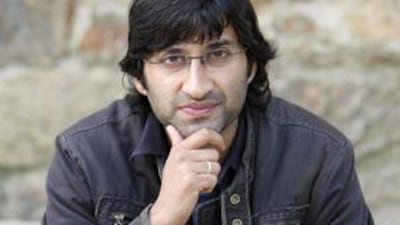Asif Kapadia is as nice a guy as you can hope to meet: incredibly polite, amiable, garrulous and engaging. That's partly why it's painful to hear the 36-year-old Far North director talk about his journey since his mesmerising and highly praised first film, The Warrior, announced his talent to the world in 2001. The cliché in music is that the second album is always difficult. It's also true of second movies. After a debut success, it is almost always difficult to live up to expectations. Kapadia decided to follow up his first film - shot in the languid, unbearably hot Indian desert - with the opposite extreme. He shot Far North, an adaptation of Sara Maitland's horrifying short story, in the icy climes of the Arctic.
It was a five-year, topsy-turvy journey. "Because of where we were shooting, we could only film in a narrow window in the autumn. There was a three-week window," Kapadia explains. "In the summer in the Arctic, there is no snow and it's always light, so it looks like a desert, and in the winter it's pitch black. In the winter, it freezes over and it's so cold that you can't think. So many planets have to be aligned to get everything in the right place - the cast, the crew and the money - and we kept on missing it. Every year we would think it would happen and it wouldn't."
In the interim, a studio called Kapadia and asked him to helm The Return, starring Sarah Michelle Gellar. What sounded like a great opportunity turned out to be an arduous adventure that the director has decided to chalk down as "an experience!". "I was a hired hand," he says. "I had very little control. There was trouble with a lot of things and it was quite a difficult film. Far North was difficult technically, but at least all the crew were pulling in the same direction. That was not the same on that studio film, which was quite political. It was a big learning curve."
The edit of The Return was taken away from Kapadia. The first time he saw the film, which bore his signature, was when he paid to watch a screening on its release. "Your name's on it, but that is not the film you started to make. At least with Far North, it is the film that I wanted to make. I don't necessarily just want to make films that I write. I want to be a director. I have friends still trying to make their first feature, and I think, what is better, to not make a film or to have a bad experience? The trick is to move on and not get bogged down and stuck because of it."
He did not have much time to fester over his experiences in Hollywood. Soon after he finished filming The Return, everything finally fell into place on Far North, and Kapadia found himself standing on the diminishing white expanse that encircles the North Pole. "I've shot a film in extreme heat and it's much harder shooting in the cold. You stop thinking. As long as you're wearing the right kit, you're OK. I know that our main actress, Michelle Yeoh, had a tricky moment during filming. She hadn't eaten properly and her blood sugar level was low. She fainted, and we were on a glacier at the time. But she was great. She just carried on and kept spirits among the crew high. Some of the crew didn't make the whole shoot, and these were tough guys who'd spent months on Bond films."
The tough conditions and the story, in which a mother and daughter bicker when a mysterious stranger arrives at their secluded outpost, made casting difficult. "They had to be Asian actresses, and that narrowed the choices even further," Kapadia admits. "Michelle says she picks films based on whether she gets on with the director. I would start off by telling all the prospective actors the bad news: that it was going to be cold, there would be no creature comforts, no five-star hotel. We would be staying on a boat. Basically, I would try my best to talk them out of doing the movie. I needed people who were strong characters."
Sean Bean met the criteria as the mysterious man, Loki, and the American actress Michelle Krusiec played the daughter. This is the second film that Kapadia has written that is set in a barren landscape and, curiously for someone with such a strong East End accent, Kapadia makes films that are marked by a distinct absence from London, where he lives with his wife and young child. In fact, he argues that he is a victim of his environment.
"I think it comes from living in London, having eight million people around me all the time and all this concrete. I like going somewhere new and experiencing things for the first time. It's at these times that images and ideas come into my head. I like fairy stories and mythical tales, magical realist tales, and I don't want to be spending money and wasting time covering up road signs. It's often quite hard for me when I'm walking around London to feel inspired. Taking the tube every day doesn't inspire me.


